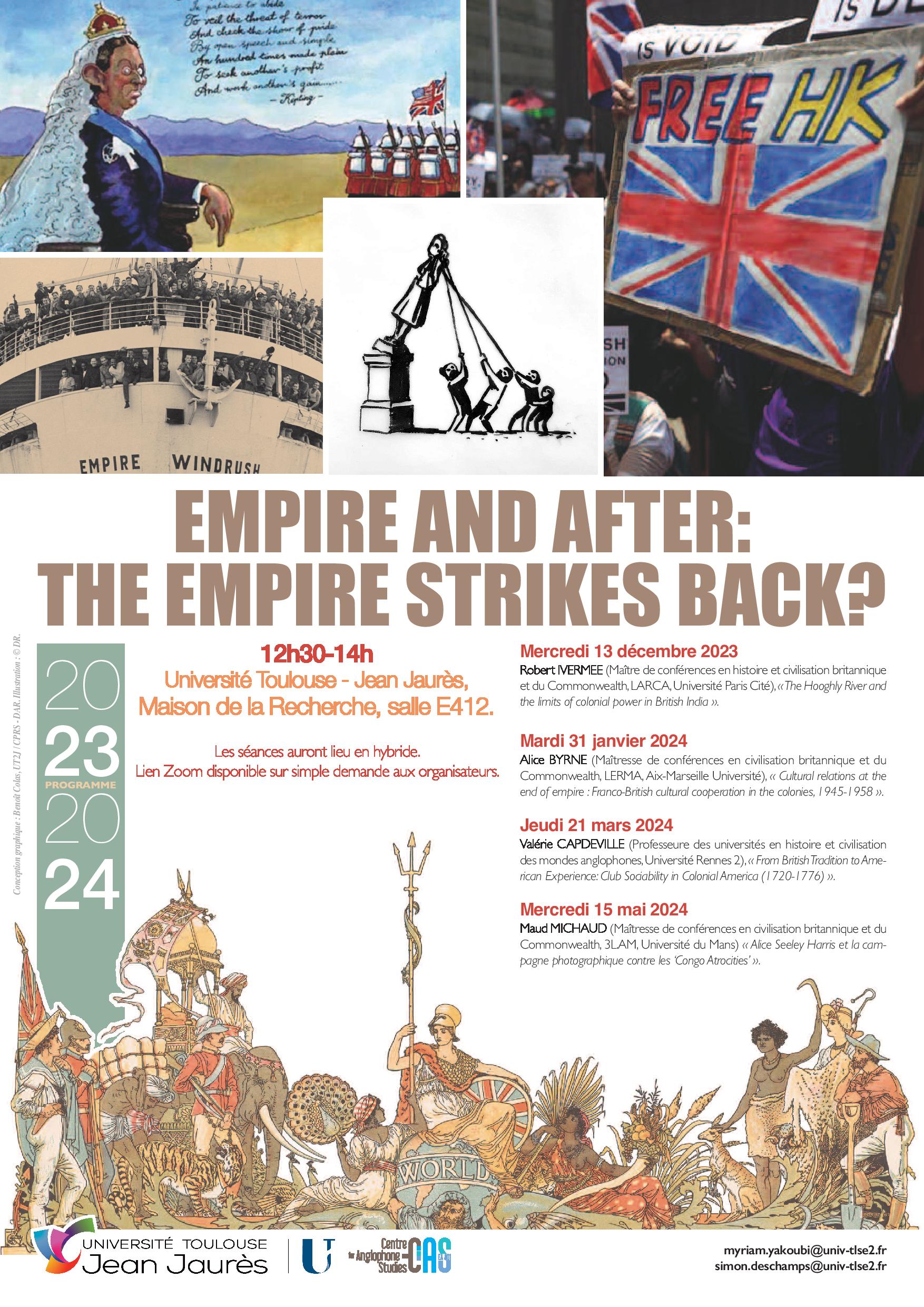-
Partager cette page
Empire and After: The Empire Strikes Back? (English)

Organisation
Myriam YakoubiSimon Deschamps
Introduction
The purpose of this seminar is to offer a new take on the history of the British Empire while also examining its influence and its political, economic and social legacies in the former colonial societies as well as in contemporary British society. The seminar will primarily focus on the British Empire but not exclusively, as colonial empires are diverse and heterogeneous entities whose specificities can only be grasped through comparison. Empire will therefore be studied in its broadest sense to include both formal and informal imperialism, territories that were ruled directly or indirectly or even mere influence networks from the 18th century to decolonization and beyond, in the context of the Commonwealth.
This seminar draws on the observation that Empire is increasingly present both in history books and the media, which often describe it as the starting point of a globalization process that keeps redefining international power relations. In the United Kingdom, recent events - Brexit in particular – have led the British colonial past to resurface with a vengeance. With ‘Empire 2.0’, the Conservatives seek to revive the former imperial preference with Commonwealth countries in order to make up for the loss of the European market. Much in the same way, events like the ‘Rhodes must fall’ campaign, which first appeared in South Africa before being taken up by Oxford University students or the resignation of the former Home Secretary Amber Rudd in the wake of the ‘Windrush scandal’ can be seen as crises testifying to the fact that Empire is indeed striking back.
In a context of growing tension between ‘universalization’ and ‘particularization’, the latest historiography tends to focus on diplomatic history, imperial and trans-imperial circulation, cultural transfers, and informal Empire. In recent years, several landmark studies devoted to Empire have contributed to putting Britain’s colonial past back in the limelight. This includes Niall Ferguson’s Empire: The Rise and Demise of the British World Order and the Lessons for Global Power (2003), whose controversial insight into the British Empire emphasizes its positive legacy. What does this renewed interest and positive reassessment say about British society today? How does it fit in with the recent literature which specifically underlines the extreme violence of decolonisation, with C. Elkins in Imperial Reckoning: The Untold Story of Britain's Gulag in Kenya (2005) and B. Fitzgibbon in Imperial Endgame: Britain's Dirty Wars and the End of Empire (2011)? The question of imperial circulations between colonial periphery and mother country has also received increased attention with Andrew Thompson’s The Empire Strikes Back?: The Impact of Imperialism on Britain from the Mid-Nineteenth Century (2005), and K. Tidrick’s Empire and the English Character: The Illusion of Authority (2009). By and large, Empire has become as much an object of fascination and nostalgia, as of embarrassment and repentance.
This seminar will precisely be an attempt to overcome binary approaches in order to do justice to the intricacies of Empire. It will also be the opportunity to revive an old tradition of the CAS research group, which very early on in its history explored the English-speaking world in all its diversity.
Themes of interest
- Empire and globalisation, imperial circulations
- Informal colonial power and native elites
- Colonial administrators’ discourses, racial and cultural representations
- National, imperial and transcolonial history
- Reassessment and legacies of colonial domination
- Domination, contestation and resistance
Bibliography
Anderson, Benedict. Imagined Communities: Reflections on the Origin And Spread of Nationalism. Revised. Verso Books, 2006.
Bayly, Christopher Alan. Imperial Meridian: The British Empire and the World, Londres: Longman, 1989
Cannadine, David. Ornamentalism: How the British Saw Their Empire. Oxford: Oxford University Press, 2001.
Colley, Linda. Britons : Forging the Nation 1707-1837, Yale University Press, 1992.
Darwin, John. Unfinished Empire: The Global Expansion of Britain. London: Bloomsbury Circle, 2013.
Guha, Ranajit. Dominance without Hegemony. Harvard: Harvard University Press, 1998.
Hyam, Ronald. Understanding the British Empire. Cambridge: Cambridge University Press, 2010.
Magee, Gary B., et Andrew S. Thompson. Empire and Globalisation: Networks of People, Goods and Capital in the British World, c.1850–1914. Cambridge: Cambridge University Press, 2010.
Said, Edward W. Culture and Imperialism. Reprint. New York: Vintage Books, 1994.
Singaravélou, Pierre. Les Empires coloniaux, XIXe-XXe siècle. Paris: Points, 2013.
Sutcliffe, Robert B. et Owen Roger, ed. Studies in the Theory of Imperialism. London: Longman, 1972.
Thompson, Andrew S. The Empire Strikes Back?: The Impact of Imperialism on Britain from the Mid-Nineteenth Century. New York: Routledge, 2005.
2021-2022 Program
2022-2023 Program

